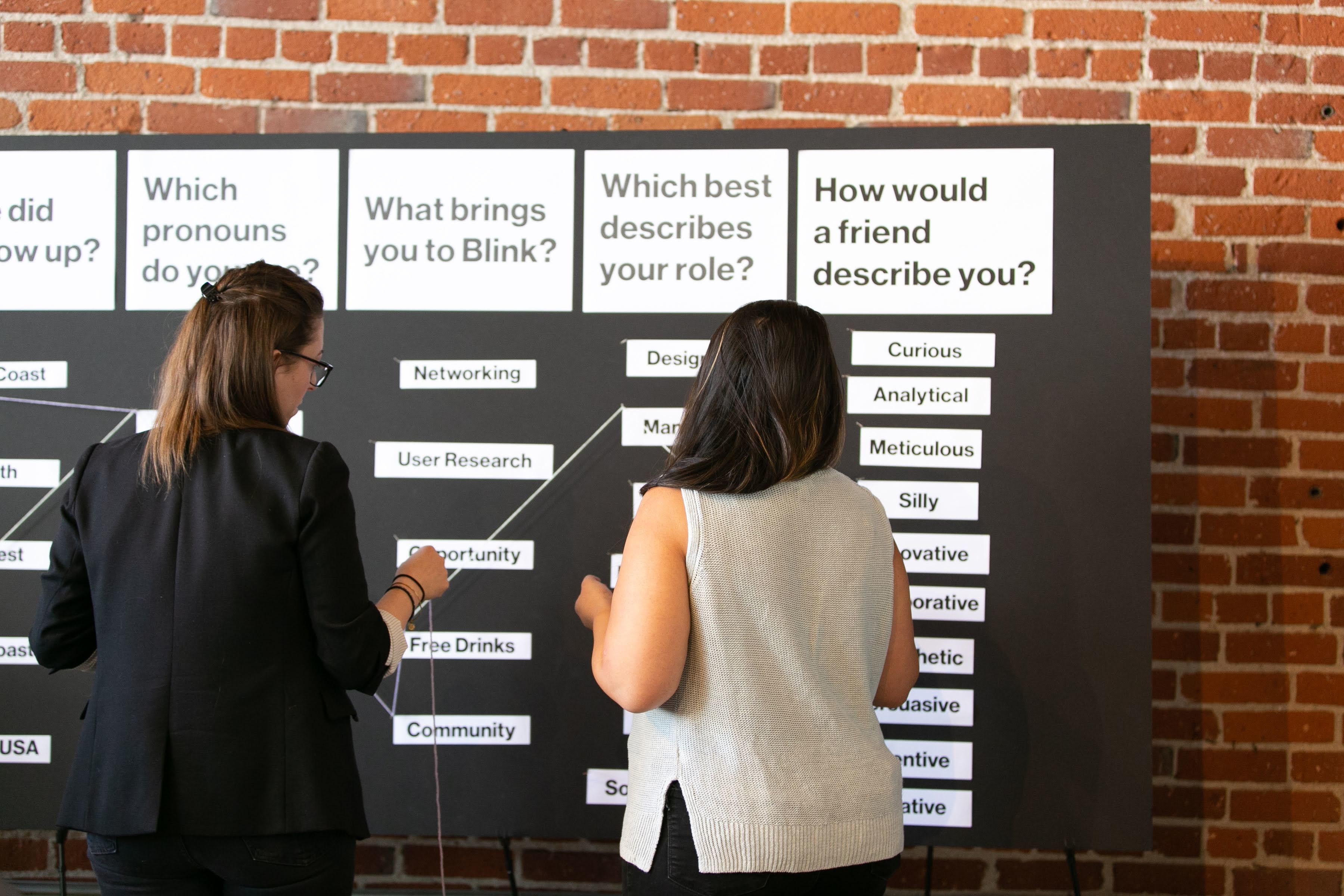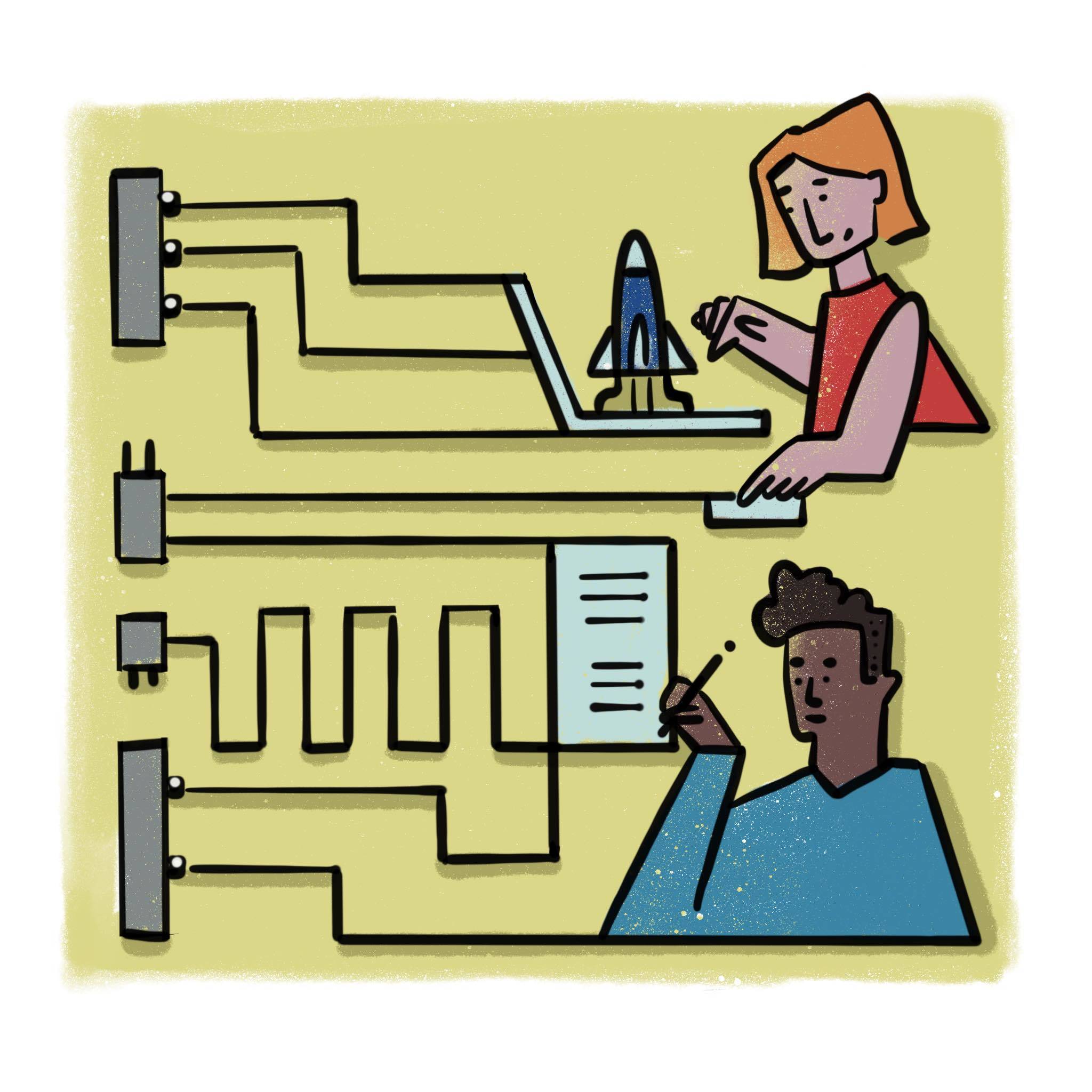
Image: Designers from Blink's Seattle studio meet the team from our San Francisco studio (formerly Redshift) for the first time.
Nature and nurture are both critical to your career path, and so at Blink, we focus on both of these in our employee development.
Understanding your innate capacity
Your “nature” refers to the hardwiring of your brain. It includes your intelligence and personality — those characteristics that make you unique and are part of your biological and environmental heritage. That hardwiring is very stable and difficult to change.
As one example, your personality plays a large role in deciding the kind of career you would enjoy compared to the kind of career that would drain your energy and enthusiasm. If your personality is wired for extraversion, you will not enjoy sitting in a cubicle all day, doing heads down work. Your brain functions better when you are in a setting that provides more sensory stimulation — from people, sound, light, movement, and so forth.
At Blink, we use a scientifically sound measure of personality for each employee in order to give them useful information about how their hardwiring may impact their energy and engagement at work. The purpose is to help them do more of what they are wired for in their jobs, and less of what is draining for them. This approach greatly helps reduce burnout.
Developing competency at work
On the other hand, we “nurture” our competencies. These are those skills, attitudes, and areas of knowledge acquired through experience and training. Competencies are available to anyone who exerts the effort to develop or “nurture” them through education, training, and supervision.
Both competencies and personality, nurture and nature, are important influences on the kind of work that people are best equipped to do. The “sweet spot” for work is where your competencies are in alignment with your hardwiring. When they are at odds, our work grinds us down, and depletes the sensitive neurological chemicals that facilitate our cognitive and emotional functioning.
Work competencies include both the technical skills and the people skills needed to do your work well. The competencies that are required for a job are developed over time. A baseball player needs to spend countless hours in batting practice to hit well during a game, even if he has great natural abilities. The same applies to your work skills. Perhaps your innate capacity leads you to the design world. You’re still best served to go to design school to learn the tricks of the trade, no matter how much natural talent you might possess. And importantly, in order to progress in our careers, we need to continue to nurture our technical competencies through experience and training.
Identifying areas for growth
At Blink, we use Motis Grow, a cloud-based, software application that helps our employees identify the competencies that they need to progress in their career and set goals that include growing technical competencies. A good manager helps determine areas for growth and helps you get the resources you need for further development. All of this may be common sense, knowing we need the technical skills to perform well at our job.

Less obvious, but equally important are the social and emotional skills you need to succeed at work. In order to be a good colleague and valued team contributor, it is essential to develop emotional and social competencies. This is especially true if you want to move into a leadership or management position. Take, for example, a senior manager who consistently fails to listen and empathize with an employee, makes a big deal out of little mistakes, and uses public shaming. All of these are examples of very poor social and emotional competencies. No matter how good this manager’s technical skills may be, the lack of social and emotional skills will result in failure as a manager: because the employee does not feel valued, they may ultimately leave or retreat in their job performance.
Social intelligence and emotional intelligence
Daniel Goleman coined the terms “social intelligence” and “emotional intelligence.” Emotional intelligence is the ability to identify the sources of emotion (both in yourself and in others) and to understand why they occur and manage them. Social intelligence is the ability to understand and negotiate complex social relationships and environments. Emotional and social intelligence matter when we talk about competencies because most jobs, no matter how big or small the team, require teamwork and strong relationships with each other. Without the ability to navigate the emotions of others as well as to understand your own emotions, your work inevitably suffers. The more your emotional and social intelligence is developed, the more effective you will be in managing teams and projects that are high performing.
Extensive research has demonstrated that leaders with high social and emotional intelligence have higher performing teams and organizations”

Just like in the batting cage, the emotional and social skills needed to complete full competency take practice and repetition. The time and energy pay off, however, and achieving them will unlock your highest levels of competency.
If your innate capacity (nature) provides guidance to the kind of work that energizes your soul and helps you thrive, competency (nurture) helps you become more effective in your job, not only technically, but also socially and emotionally. At the end of the day, the most important point about your nature and your nurture is that you understand them. Self-discovery is fun and interesting, and understanding your “hardwiring” will help you live a happy and fulfilled life.
Curious about working better at Blink?
Explore our About page to see open positions and get in touch.
